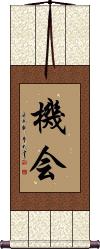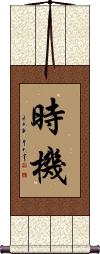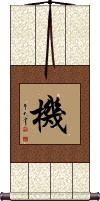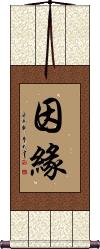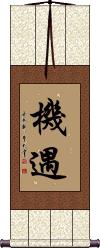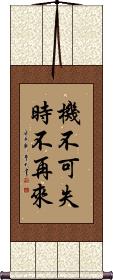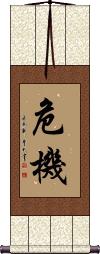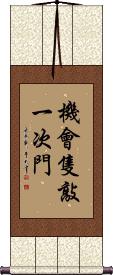Many custom options...
And formats...

Opportunity in Chinese / Japanese...
Buy an Opportunity calligraphy wall scroll here!
Personalize your custom “Opportunity” project by clicking the button next to your favorite “Opportunity” title below...
1. Opportunity
2. Fate / Opportunity / Chance
4. Opportunity Knocks Only Once
Opportunity
機会 is a common way to express “opportunity” in Japanese.
The first character means “chance,” and the second can be translated as “meeting.”
So in Japanese business, a “chance meeting” represents a real “opportunity.”
Note that this also means opportunity in Chinese, but it's more an oral or informal word in Mandarin. Also, the second Kanji is the same as the simplified version of the hui Chinese character.
Opportunity
Opportune Time
時機 is a common way to express day-to-day opportunities.
It's sometimes used to express “an occasion.”
Opportunity
機 is an odd one - I've seen this on coffee cups and posters with the meaning of “opportunity.”
機 is a correct definition but this character also means “machine.” In fact, if you put the character for “flying” in front of this character, you have the Chinese word for “airplane” (literally: flying machine). Alone, on a wall scroll, it will be generally understood as “opportunity” but I want you to know this extra information before you make your selection. Note that in Japanese and Korean, this has a similar meaning but can also mean machine or loom.
See Also: Success
Fate / Opportunity / Chance
The Buddhist idea of Fate
因緣 is the Buddhist concept of a chance meeting or an opportunity that presents itself by fate.
Sometimes this is used to describe a cosmic chain of events or cause and effect.
It also is used to describe predestined relationships between people - and sometimes married couples (although if you want one about marriage, try this: Fate / Destiny of Lovers.
因緣 can also be translated as origin, karma, destiny, affinity, connection, and relation. This all depends on context - seen alone on a wall scroll, this will be read with a “fate/chance” meaning by a Chinese person or a Korean person who can read Hanja.
The more complex definition of this word would be, “Direct causes and indirect conditions, which underlie the actions of all things.”
This concept is known as nidana in the original Sanskrit. Also sometimes presented as hetupratyaya (or “hetu and prataya”), which I believe is Pali.
Note: Japanese will tend to use this version of the second Kanji: ![]()
If you order this from the Japanese master calligrapher, expect that you’ll get this version. However, this word often carries a negative connotation in Japanese (bad things happen), as it is used that way in a certain Japanese idiom. Therefore, this may not be the best choice if Japanese is your target language.
See Also: Buddhism | Opportunity
Opportunity / Good Luck
機遇 is the kind of opportunity that comes via good luck or good fortune.
This word is sometimes translated as “stroke of good luck.”
While there are other ways to express “opportunity,” I think this version is best for a calligraphy wall scroll or portrait.
Note: In Korean Hanja, this would also mean “Meeting someone under strange circumstances.”
See Also: Good Luck
Opportunity Knocks Only Once
Crisis equals Danger plus Opportunity?
危機 means crisis in Chinese and Japanese.
Separately, the first character here does mean “danger” or “to endanger,” and the second character can mean “opportunity.”
However, I want to debunk a myth that was propagated by some westerners who did not have a clear understanding of Asian languages...
While often, Chinese/Japanese/Korean compound words (words of two or more characters) are the sum of their parts, this is not always the case. The compound is often understood with a completely different meaning than the two characters individually.
Many have said that the Chinese/Japanese/Korean word for Crisis is made up of the characters for “danger” and “opportunity.” 危機 is true when phrased this way.
However, it's not absolutely correct to say that “danger + opportunity = crisis” in Asian cultures.
English example:
If I tell you that...
Bovine creature + Guy behind the plate in baseball = Locomotive train protection
![]()
...you would think I was mad. But consider that “cow + catcher = cowcatcher,” which is the device that used to be found on steam engines to protect them if they hit an animal on the tracks. When we hear the word “cowcatcher,” we don't separate the words into their individual meanings (necessarily).
The same is true with the word for crisis in Chinese/Japanese/Korean. While you can separate the characters, few Asian people would automatically do so in their minds.
The final answer:
It is a half-truth to say, “danger plus opportunity equals crisis” in Chinese/Japanese/Korean. Use this statement and concept with caution.
Also, the second character can mean “secret” or “machine,” depending on context so I guess you have to say “a dangerous machine = crisis” or “danger + a secret = crisis.” Both of these are only slightly more ridiculous than the first premise.
PS: 危機 is probably not a great word for a scroll unless you have a special use for it.
Opportunity Knocks Only Once
These search terms might be related to Opportunity:
Fate / Chance Meeting
Fate / Opportunity / Chance
Opening / Blooming Flowers
Serendipity / Chance Discovery
The following table may be helpful for those studying Chinese or Japanese...
| Title | Characters | Romaji (Romanized Japanese) | Various forms of Romanized Chinese | |
| Opportunity | 機會 机会 | kikai | jī huì / ji1 hui4 / ji hui / jihui | chi hui / chihui |
| Opportunity | 時機 时机 | shí jī / shi2 ji1 / shi ji / shiji | shih chi / shihchi | |
| Opportunity | 機 机 | hata | jī / ji1 / ji | chi |
| Fate Opportunity Chance | 因緣 因缘 / 因縁 | in nen / innen | yīn yuán / yin1 yuan2 / yin yuan / yinyuan | yin yüan / yinyüan |
| Opportunity Good Luck | 機遇 机遇 | jī yù / ji1 yu4 / ji yu / jiyu | chi yü / chiyü | |
| Opportunity Knocks Only Once | 機不可失時不再來 机不可失时不再来 | jī bù kě shī shí bù zài lái ji1 bu4 ke3 shi1 shi2 bu4 zai4 lai2 ji bu ke shi shi bu zai lai jibukeshishibuzailai | chi pu k`o shih shih pu tsai lai chipukoshihshihputsailai chi pu ko shih shih pu tsai lai |
|
| Crisis equals Danger plus Opportunity? | 危機 危机 | kiki | wēi jī / wei1 ji1 / wei ji / weiji | wei chi / weichi |
| Opportunity Knocks Only Once | 機會隻敲一次門 机会只敲一次门 | jī huì zhǐ qiāo yī cì mén ji1 hui4 zhi3 qiao1 yi1 ci4 men2 ji hui zhi qiao yi ci men jihuizhiqiaoyicimen | chi hui chih ch`iao i tz`u men chihuichihchiaoitzumen chi hui chih chiao i tzu men |
|
| In some entries above you will see that characters have different versions above and below a line. In these cases, the characters above the line are Traditional Chinese, while the ones below are Simplified Chinese. | ||||
Successful Chinese Character and Japanese Kanji calligraphy searches within the last few hours...
